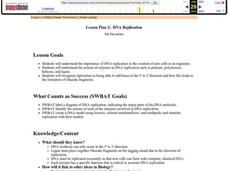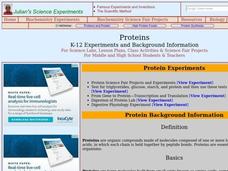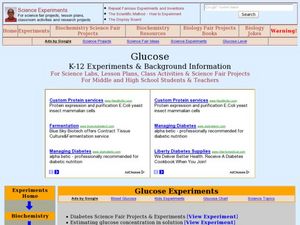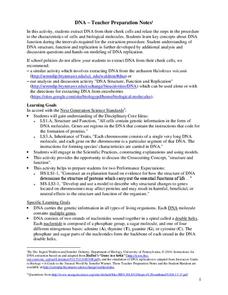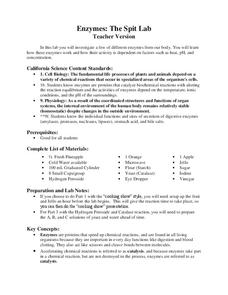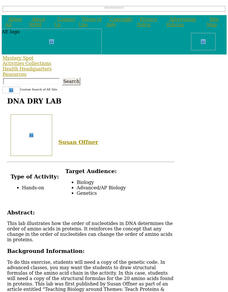Curated OER
Observation Milk Fat Lesson
Turn your class loose to experiment with the different fat content in skim milk, whole milk, half and half, and heavy cream. This is a visually vibrant experiment, as learners drip food coloring on the surface of the products and measure...
Curated OER
Exploring Molecules
Students explore the process of science by studying and analyzing fundamental biological molecules in this introductory lesson on molecules. The lesson includes a pre-lesson worksheet and a question sheet for final, individual assessment.
Curated OER
Building a DNA Molecule, Mitosis in Motion and Mutation Gossip
Students explore three lab experiments involving DNA, mitosis, and mutation. They complete activities and play games to review DNA, mitosis and mutation concepts. They build a DNA molecule and create flip cards representing mitosis in...
Curated OER
DNA Replication
Students create a model of DNA and simulate replication with their models in an activity that uses licorice, colored marshmallows, and toothpicks. Students also label a diagram of replication and indicate major parts of the DNA molecule.
Serendip
Cells as Molecular Factories
Cells are both made of molecules and make molecules all at the same time! An exploratory lesson provides a means for scholars to research the components of cells made of molecules and also investigate the molecule-producing power of...
Curated OER
Sugar Solutions
Seventh graders study biological systems and how they reach equilibrium. In this system balance lesson students divide into groups and complete an osmosis lab activity.
Curated OER
Testing for Lipids, Proteins and Carbohydrates
Young scholars perform tests for the presence of certain macromolecules. In this health and biology lesson, students rotate in groups to three lab stations and perform tests for proteins, lipids, and carbohydrates found in...
Cornell University
The Making of Macromolecules
Compare and contrast macromolecules made from the same elements. Young scholars learn how the structure of a molecule has as much influence on a compound as the elements in the molecule. They experiment with molecular model kits to...
Curated OER
Mapping the Human Genome
Students study DNA and how it was discovered. In this biology lesson students see the effects of mapping the human genome would have.
Curated OER
What is Everything Made of?
Students observe a demonstration on how we see space between water molecules. In this experimental lesson students discover what elements make up the things around them and discuss what they learned.
Curated OER
Lab Experiments in Nutrition
Looking for authentic hands-on nutritional experiments? High schoolers will perform experiments to test for the presence of vitamin C in several solutions as well as the effect of caffeine on Daphnia. They will also consider the...
Curated OER
Biology Demos
Students participate in biology demos. In this biology lesson, students explain how energy is released in the ATP cycle. They demonstrate DNA replication process.
Curated OER
Chlorophyll
Learners explain the importance of chlorophyll in plants. For this biology lesson, students extract chlorophyll from different plant sources using chromatography. They discover the different factors needed for photosynthesis to take place.
Curated OER
Plant Hormones
High schoolers identify different plant hormones and explain their function in plant development. In this biology lesson, students investigate how IAA affect root growth. They study the history of auxin discovery.
Curated OER
Gel Electrophoresis
Learners conduct a variety of experiments to explore gel electrophoresis. For this biology lesson, explain how this process separate DNA and RNA. They discuss the practical applications of this method.
Curated OER
Proteins
Students conduct a variety of experiments to explore protein. In this biology lesson plan, students solve a mystery by testing for the presence of glucose, protein starch and triglycerides. They explain how DNA transcription and...
Curated OER
Glucose
Young scholars conduct various experiments on glucose. In this biology lesson, students differentiate the process of diffusion and osmosis. They test different foods for the presence of glucose and starch.
Curated OER
Plankton / Phytoplankton
Students discuss the importance of plankton in the ocean ecosystem. In this biology lesson, students identify the different types plankton by observing them under the microscope. They explain how plankton population affect global climate.
Curated OER
Extracting DNA from Your Cells - Teacher Preparation Notes
Students extract their own DNA from cheek cells. In this biology instructional activity, students explain the replication process. They identify the structure and composition of DNA.
Curated OER
Atoms and Elements: An Introduction
Learners are able to discuss the difference between a proton, a neutron and an electron. They also can explain the difference between an ionic and a covalent bond. Students know the main structure of atoms and molecules. Student are able...
Curated OER
Waves and Currents
Students are introduced to the forces that are responsible for generating waves in the ocean and how these forcesf differ from those that cause currents. They are able to explain how water molecules in a wave do not move in the direction...
Curated OER
Light and Starch Production in Photosynthesis
Students are given the unique opportunity to see the contrast between parts of a leaf that have photosynthesized and parts of the leaf that have not. This visual image helps students see the results of this biological process. At the...
LABScI
Enzymes: The Spit Lab
Enzymes in our bodies each have a job to do. Learn the factors that affect the activity of some enzymes using the third activity of an informative 12-part biology series. A three-part laboratory activity asks teams to investigate how...
Curated OER
DNA Dry Lab
Young scholars use a DNA strand to identify the component parts. They discuss an RNA molecule, protein fragments, and nucleotides. They explore how the order of nucleotides determines the order of amino acids in proteins.



